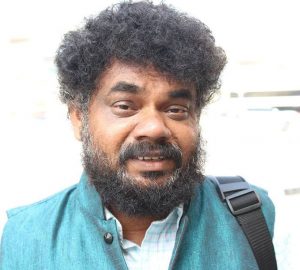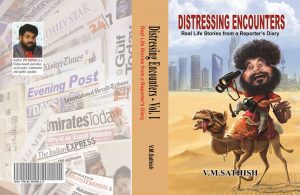The unexpected demise of V.M. Sathish—a veteran Expat-journalist who spent a quarter century of reporting in the GCC countries—has left a deep vacuum in the domain of ‘human interest’ writings in the world of media. Sathish has a reputed track-record in Expat-journalism. Beginning with the Indian Express Group of newspapers in Mumbai, he held many positions over the next two and a half decades. After serving in India for some years, he moved to the Oman Daily Observer (Muscat) as a business reporter and then worked for the Daily Star/International Herald Tribune, The Gulf News, Khaleej Times, Emirates Evening Post and 7DAYS. After quitting Khaleej Times, Sathish started a digital portal "Expat News" and ‘Digital Malayalee’ from his home town in Kerala with the same mission he had in the Gulf.
Leading English newspapers like the Telegraph, the Sunday Observer, the Observer of Business and Politics, The Independent and Times of India, Financial Express, Business Standard, the Free Press Journal, Maharashtra Herald, Hindustan Times and the Blitz, Lokmat Times, Onlooker etc carried his investigating reports and edit page articles. Indian Journal of Political Science, Man and Development, Radical Humanist etc. A regular commentator on radio and television, Sathish has to his credit more than a thousand stories exposing corruption and human rights violations, unraveling agonies of the expatriates and reporting about unfair practices in business and politics.
Sathish had worked in Oman for nearly six years. Some of the investigative reporting about corruption, human rights violations and many other malpractices provoked a group of businessmen to lobby against him. From Oman, he had worked as a correspondent for Asianet. After exposing rampant corruption in the Indian Schools in Oman and reporting about unfair labour practices, he had moved to the Dubai Media City to work as a freelance journalist for leading English newspapers from the region. For some of the controversial articles that he published in Dubai, he got into a defamation case against the powerful business groups and ultimately he emerged victorious. He had worked for Star News India covering the controversial marriage of underworld don Dawood Ibrahim’s daughter’s marriage to the son of former Pakistan Cricket Captain.
Sathish was an active member and office bearer of Indian Media Forum UAE, an association of Indian journalists in the UAE. He had worked as Vice President of the organization, which strove for the welfare of Indian journalists working in the Middle East. He had been featured in leading newspapers and magazines, Thursday Magazine of Times of Oman, Khaleej Times, Middle East Chandrika, the Reporter TV, FM Radio Media Village etc. He had also been active in the parallel media and social media, with thousands of followers on the social networking sites. The "Kerala Monitor" online blog he maintained carried many critical stories and issues.
Sathish was a regular commentator on the radio stations and television channels. He had been campaigning against social malaises like growing suicide among the Indian expatriates in the Gulf and the erosion of family values, especially the abandoning of aged parents by their own children. As part of this campaign, he had played an important role in an Indian Short Film, Bibi, which was well received by the community.
A Post Graduate in International Relations from the School of International Relations and Politics, Mahatma Gandhi University, Sathish obtained a University First Rank for his MA. He received MPhil degree in International Relations from the Pondicherry Central University with First Class and First Rank and had been doing a doctoral research in the Department of Politics and Civics, Bombay University with a Ford Foundation Doctor Fellowship.
A scholar with an academic bend of mind, Sathish very well understood the critical role of media in the contemporary world situation and its ever-expanding engagements and their profound impact on the lives of people across nations. He strongly believed that social networks and blogs would sustain a new public sphere wherein the "netizens" were much more autonomous in informing/expressing opinion on matters of wider importance.
Sathish worked in a situation when technological advances became a challenging scenario in media-industry. With the advent of digital editing, text messages and dot-com journalism, the world of media transformed itself from what it was a quarter century ago. Most journalists in the developed world — and many of those elsewhere — had come to work in a converged media environment. They filed stories, often simultaneously, for newspapers, audiovisual and online media; they were multiskilled, presentable, technocrats of a new media landscape that left little time or space for ethical reflection. The cynical, vaguely disreputable, hard-drinking stereotype of journalistic myth had been fully eclipsed. Meanwhile, working conditions have become perceptibly challenging across the world. Often as not, journalists were increasingly distant from the point of editing, production and dissemination of their work. Almost a third of journalists worldwide are freelance, many of them working in poor, insecure and unprotected social conditions. Young people graduating in journalism join a growing pool of exploited labour working in a twilight world with no secure employment. Sathish understood that journalism has been more susceptible to undue corporate and political influence.
The problem confronting journalists like Sathish was how to safeguard their independence when the world around them called for their unquestioning loyalty to the cause they espoused. The imperatives of journalism — truth-telling, independence and awareness of the impact of words and images on society — reinforced by political freedom and open government provide the backbone of democratic pluralism, but reporters are right to ask what becomes of scrutiny when journalism is the creature of political or social movements, no matter how well meaning they may be. Sathish used to tell that this latent ethical signpost was weakening in the wake of changes now overtaking media. For many, like Sathish, violations of human rights take place "at home" rather than "abroad". For journalists working within repressive regimes, human rights abuse goes hand in hand with the routine of daily life.
It was under these circumstances that Sathish saw the value of journalistic activism and advocacy. Many argue that journalism is not necessarily concerned with human rights issues in general or the struggle against discrimination in particular. Yet, as institutions and individuals whose principal mission is to inform, the media and the journalists play a key role in shaping how people think about each other, and influence directly and indirectly public policy on crucial social issues. They cannot afford to ignore injustice, discrimination, human rights violations, wittingly or unwittingly.
Sathish’s book Distressing Encounters (published by the KPS Menon Chair, School of International Relations and Politics, Mahatma Gandhi University) is an epitome of such endeavours carried on by him for more than two decades in India and the Gulf countries. It is a collection of investigating reports appeared in different newspapers over a period of fifteen years. Through this Sathish sought to provide an insight into the complexities of the expatriates’ life-world in the Gulf countries who, for a long time, have been subjected to unfair labour practices, human rights violation, distress, despair, cheating etc. Expatriates life has long been a subject of films and literature, but seldom did they produce any concrete results in changing the real life situation of millions of hapless poor. It was here that the role of committed journalists like Sathish deserved serious study. He rose to eminence in the realm of multi-media journalism not only because of his investigating reports and stories, but also because of the way he pursued each issue with determination and devotion. Journalism, for Sathish, had been a liberative instrument with which he always sought to ensure that each story/report he brought forth had a positive impact. The reports of suicides, corruption, inhuman conditions of labour camps, health hazards, atrocities on women and children all suggest Sathish’s commitment and skill. Many of his reports/stories related to the weak and poorer sections of society who often grappled with trying times in their expatriate life-world. Sathish obviously spent a lot of time beyond his professional commitment by campaigning against growing suicide among the Indian expatriates in the Gulf and the erosion of family values, especially the abandoning of aged parents by their own children. He also found time to get associated with many welfare schemes for the media fraternity and in helping distressed Indian expatriates.
Sathish wrote that though UAE was a relatively peaceful country with high living standards, life had become difficult and most challenging for the marginalised people. As in any other cosmopolitan city, there were startling accounts of homeless people. Crime reporting had been a major challenge for an expatriate journalist like him, but the law enforcement mechanism in these countries had been strictly keeping the crime rate under control. Yet, as Sathish wrote, crimes did happen and such stories were randomly included in Distressing Encounters. Sathish had first-hand experience in seeing several victims of natural calamities like floods, earthquakes or man-made civil wars or invasions. The region also witnessed many wars in the past, dislocating and displacing ordinary people. He had many stories to tell about the agonies of displacement.
Sathish is, no doubt, a symbol of an expatriate journalist’s unflinching commitment and emancipatory mission.






